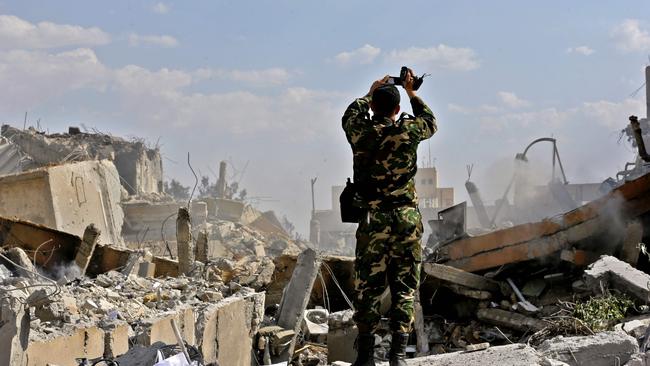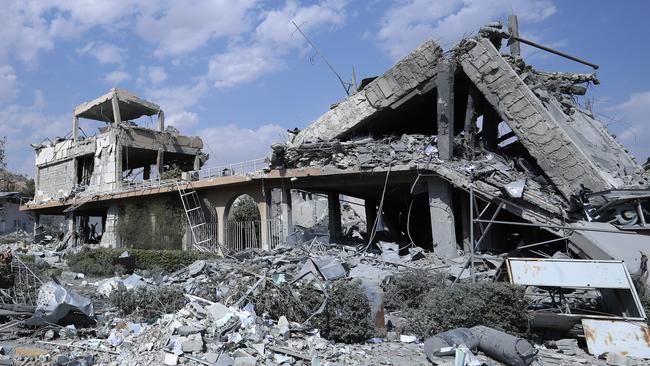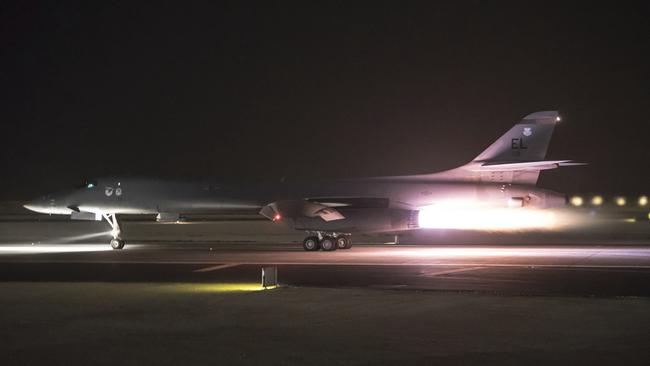US to hit Russia with new sanctions for aiding Syria
US to impose new economic sanctions on Russia for aiding Syria as Donald Trump warns America remains “locked and loaded’’ for another missile strike.

President Donald Trump has defended his use of the phrase “Mission Accomplished” to describe a US-led missile attack on Syria’s chemical weapons program, even as his aides stressed continuing US troop involvement and plans for new economic sanctions against Russia for enabling the government of Bashar al-Assad.
Stepping up the pressure on Syria’s president, US Ambassador to the United Nations Nikki Haley indicated the sanctions to be announced today would be aimed at sending a message to Russia, which she said has blocked six attempts by the UN Security Council to make it easier to investigate the use of chemical weapons.
“Everyone is going to feel it at this point,” Ms Haley said, warning of consequences for Assad’s foreign allies.
“The international community will not allow chemical weapons to come back into our everyday life,” she said. “The fact he was making this more normal and that Russia was covering this up, all that has got to stop.”
In an early-morning tweet, Mr Trump said the strike was “perfectly carried out” and that “the only way the Fake News Media could demean was by my use of the term “Mission Accomplished.” He added that he knew the media would “seize” on the phrase, but said it should be used often. “It is such a great Military term, it should be brought back,” he wrote.
The Syrian raid was so perfectly carried out, with such precision, that the only way the Fake News Media could demean was by my use of the term “Mission Accomplished.†I knew they would seize on this but felt it is such a great Military term, it should be brought back. Use often!
— Donald J. Trump (@realDonaldTrump) April 15, 2018
Mr Trump tweeted “Mission Accomplished” on Saturday after US, French and British warplanes and ships launched more than 100 missiles nearly unopposed by Syrian air defenses.
The US president warned that America remains “locked and loaded” to launch another missile strike on Syria if it uses chemical weapons against its own people again, amid fears of possible Russian reprisals on the US and its allies.
The successful strikes prompted a furious response from Russian President Vladimir Putin, who said the attacks would have “a destructive effect on the entire system of international relations”.
Russia chose not to carry out its threat to try to shoot down the US missiles, while Syria’s air defence system reportedly fired 40 surface-to-air missiles but missed all of the incoming American missiles.
While Mr Trump declared success, the Pentagon said the pummeling of three chemical-related facilities left enough others intact to enable the Assad government to use banned weapons against civilians if it chooses.
His choice of words recalled a similar claim associated with President George W. Bush following the US-led invasion of Iraq. Bush addressed sailors aboard a Navy ship in May 2003 alongside a “Mission Accomplished” banner, just weeks before it became apparent that Iraqis had organised an insurgency that would tie down US forces for years.
Overnight, Ms Haley made clear the United States won’t be pulling troops out of Syria right away, saying US involvement there “is not done.”
She said the three US goals for accomplishing its mission are making sure chemical weapons are not used in a way that could harm US national interests; that the Islamic State group is defeated; and that there is a good vantage point to watch what Iran is doing.
“We’re not going to leave until we know we’ve accomplished those things,” she said.
Ms Haley said the joint military strike “put a heavy blow into their chemical weapons program, setting them back years” and reiterated that if Assad uses poison gas again, “the United States is locked and loaded.”

Australian reaction
Last night, Malcolm Turnbull — who had earlier castigated Russia for its “sponsorship” of the Syrian government — said he would hold emergency talks this week with his British counterpart, Prime Minister Theresa May, on the security threats in the wake of the strike on Syria.
British media yesterday reported that there were concerns within Downing Street that the rock-bottom relationship between Britain and Russia could lead to a Russian cyber attack aimed at knocking out critical government infrastructure, a dirty smear campaign by Russian trolls and the country being flooded with Russian spies.
In a statement released late last night ahead of his trip this week to the Commonwealth Heads of Government Meeting in England, the Prime Minister said he would first travel to London to discuss with Mrs May the “ongoing threats from terrorism, foreign interference and malicious cyber actors, as well as uncertainty in the Korean peninsula”.
“I will explore ways to further strengthen our co-operation on intelligence and security,” he said.
“The trip comes at a crucial time. Chemical weapons attacks in Syria and on the streets of England have sparked a strong and united response from Australia and our allies. I look forward to discussing how the Commonwealth can contribute to a fairer, more sustainable, secure and prosperous future.
“We will reinforce the global rules-based order and strengthen the resilience of our near neighbours in the Pacific.”
Foreign Minister Julie Bishop said while Australia was not a participant in the US-Britain-France operation to degrade Syria’s chemical weapons capability, “we maintain constant monitoring of our cyber-networks for intrusions and hostile activity”.
“The government is aware of Russian cyber attacks and will call out Moscow as appropriate,” Ms Bishop told The Australian.
With the US warning it is prepared for a possible further strike, it is unclear whether Australia would be involved without any strike aircraft in the Middle East.
When asked whether Australia would be involved in any future attack, Mr Turnbull yesterday said Australia had withdrawn some of its military assets in the Middle East after the substantive collapse of Islamic State.
He backed the strikes, saying they were “a calibrated, proportionate and targeted response”.
“The use of chemical weapons by anyone, anywhere, under any circumstances is illegal and utterly reprehensible. The Assad regime must not be allowed to commit such crimes with impunity,” he said.

Strike was ‘precise’
Syria’s allies Iran and Russia called the strike a “military crime”, but Russia failed to secure a UN resolution yesterday to condemn the “aggression” of the US, Britain and France.
Although the attack was about twice as large as the previous US missile strike on Syria last April, it was narrowly directed at chemical weapons sites and was not as large as many were expecting. It is unlikely to destabilise the Assad regime but it may deter it from ordering further chemical weapons strikes against its own people.
The Pentagon’s Director of the Joint Staff, Lieutenant General Kenneth McKenzie, said the attacks hit “the sweet spot” in targeting three chemical weapons sites in Syria. He said the strike “took the heart” out of Syria’s chemical weapons capabilities but conceded there were “residual” chemical weapons in the country.
“There is still a residual element of the Syrian program that is out there,” he said. “I’m not going to say they’re going to be unable to continue to conduct a chemical attack in the future. I suspect, however, they’ll think long and hard about it.”
The strikes involved 105 US and allied missiles fired from three US navy ships, one US submarine, US B-1B strategic bombers and British and French attack aircraft.
The targets included the Barzeh chemical weapons research and development near Damascus, a chemical weapons storage facility near Homs and a chemical weapons “bunker”.
The US said each target was destroyed, but Syria’s ambassador to the UN, Bashar Jaafari, said 100 US missiles were shot down and three civilians had been injured.
The US said it was unaware of any confirmed fatalities or injuries. The strikes were carefully targeted to ensure they did not strike either civilians or Russian troops, many of whom are serving alongside Syrian government forces.
The US gave mixed signals about how much warning it gave to Russia before the strikes.
Although the Pentagon said it gave Moscow no specific warning of the strikes, America’s ambassador in Moscow, John Huntsman, said before the action was taken, the US “communicated with” Russia to “reduce the danger of any Russian or civilian casualties”.
Mrs May said she, Mr Trump and French President Emmanuel Macron agreed the attack was successful in “sending a clear message that the use of chemical weapons can never become normalised”.
With AP







